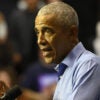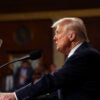Benghazi is back in the news with the arrest of a suspect Thursday being held in Libya. This could spur Congress to renew efforts to shine light on the attack on the U.S. consulate on September 11, 2012.
Wounded survivors of the terrorist attack, however, are still under wraps. As reported by The Hill newspaper, Senators are applying pressure again. One option is to subpoena the survivors; another is to hold up confirmation for the new ambassador to Libya, Deborah Jones, who would replace murdered U.S. ambassador Christopher Stevens.
Such tactics were semi-successfully used on the confirmations of Secretary of Defense Chuck Hagel and director of Central Intelligence John Brennan. While both men were eventually confirmed by the Senate, the tactics did result in the White House shedding slightly more light on the events of that fateful night and its befuddled media aftermath. Tons more questions remain, though, that have not been answered in the two official reports nor in the several House and Senate Benghazi hearings.
Even though a reported 30 survivors have received treatment at Walter Reed Hospital in Bethesda, and some remain hospitalized more than six months after the tragedy, the media have failed to locate even one for an interview, and Members of Congress have been unable to call them to testify.
In a letter dated March 1, Representatives Frank Wolf (R–VA) and Jim Gerlach (R–PA) demanded names and contact information for each survivor, some State Department employees, and some CIA contractors to make it possible to contact them. Wolfe’s argument is that the survivors should not just be questioned but also publicly acknowledged for their bravery that night in September. “We should be honoring them,” Wolf said. “We should be thanking them.”
Subsequent to this letter, Secretary of State John Kerry admitted that he had visited a survivor located at Walter Reed, which, as far as we know, is at least more than his predecessor Hillary Clinton ever did.
Questions that remain unanswered include the reason for the Benghazi consulate’s existence, the rationale for the consulate’s lack of security in the face of such obvious terrorist threats, and the roots of the Administration’s failure to come to the aid of Americans under attack.
The survivors of Benghazi certainly have knowledge that is relevant and possibly incriminating and should have the opportunity to tell what they know.































